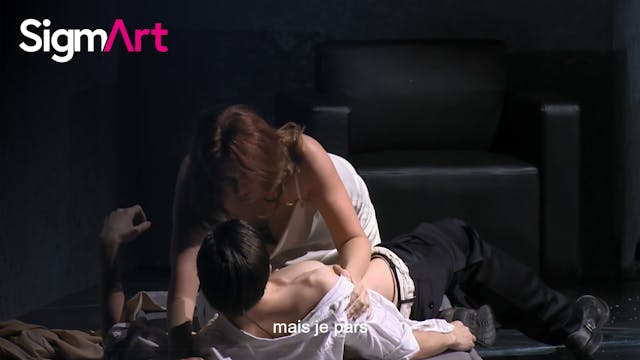KING ARTHUR Lyric Tragedy by Henry Purcell
Drama & Lyric Tragedy
•
2h 1m
Language: English
Subtitles: English, French, German, Italian, Spanish
King Arthur, or The British Worthy, is a semi-opera in five acts with music by Henry Purcell and a libretto by John Dryden. It was first performed at the Queen's Theatre, Dorset Garden, London, in late May or early June 1691.
The plot is based on the battles between King Arthur's Britons and the Saxons, rather than the legends of Camelot (although Merlin does make an appearance). It is a Restoration spectacular, including such supernatural characters as Cupid and Venus plus references to the Germanic gods of the Saxons, Woden, Thor, and Freya. The tale centres on Arthur's endeavours to recover his fiancée, the blind Cornish Princess Emmeline, who has been abducted by his arch-enemy, the Saxon King Oswald of Kent.
King Arthur is a "dramatick opera" or semi-opera: the principal characters do not sing, except if they are supernatural, pastoral or, in the case of Comus and the popular Your hay it is mow'd, drunk. Secondary characters sing to them, usually as diegetic entertainment, but in Act 4 and parts of Act 2, as supernatural beckonings. The singing in Act 1 is religious observance by the Saxons, ending with their heroic afterlife in Valhalla. The protagonists are actors, as a great deal of King Arthur consists of spoken text. This was normal practice in 17th century English opera. King Arthur contains some of Purcell's most lyrical music, using adventurous harmonies for the day.
We know that, despite the title ("Dramatick Opera", often translated as "semi-opera") King Arthur is a dramatic work, mixed with music, in which the main characters do not sing a note, with the exception of Philidel , the benevolent spirit, and Grimbald, its opposite. Seven tableaux, divided here into four acts (five with the final mask), preceded by a composite opening, follow one another, punctuating Dryden's play. We will thus have the temple scene where the Saxons sacrifice their victims before facing the Bretons, who achieve victory. Philidel, who has joined Arthur, and his rival Grimbald lead, or attempt to lead, then the Bretons into the night. After a pastoral entertainment, Arthur's beloved Emmeline is kidnapped by the vile magician Osmond. Neither Merlin nor Philidel manage to free her because after the woods, the sorcerer transforms the countryside into a desert of ice, which Cupid will melt. Arthur himself is tempted by nymphs and woods, at the instigation of Grimbald to turn him away from Emmeline. But Philidel is watching. The fight between Oswald and Arthur gives the latter the advantage, who will finally marry Emmeline, with a celebration of victory staged by Merlin.
Direction: Lionel Meunier (Music Conductor)
Cast: Vox Luminis, Cupid / Honour: Sophie Junker, Shepherdess / Syren / Nymph / Venus: Zsuzsi Tóth, Priestess / Shepherdess / Syren / She: Stefanie True, Philidel / Nymph / Nereid: Caroline Weynants, Comus, et parties de ténor solo: Oliver Berten, Second Saxon Priest / British Warrior / Peasant: Robert Buckland, Nymph: Daniel Elgersma, Grimbald / Aeolus / He: Marcus Farnsworth, Peasant: David Feldman, Priestess / Man: Jan Kullmann, First Saxon Priest / Cold genius / Sylvan / Pan / Peasant: Sebastian Myrus
Up Next in Drama & Lyric Tragedy
-
MÉDÉE Lyric Tragedy by Marc-Antoine C...
[Language: French with Burnt-in French Subtitles]
Médée is a tragédie mise en musique in five acts and a prologue by Marc-Antoine Charpentier to a French libretto by Thomas Corneille. It was premiered at the Théâtre du Palais-Royal in Paris on December 4, 1693, in the presence of Louis XIV. Médé...

